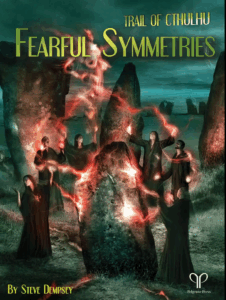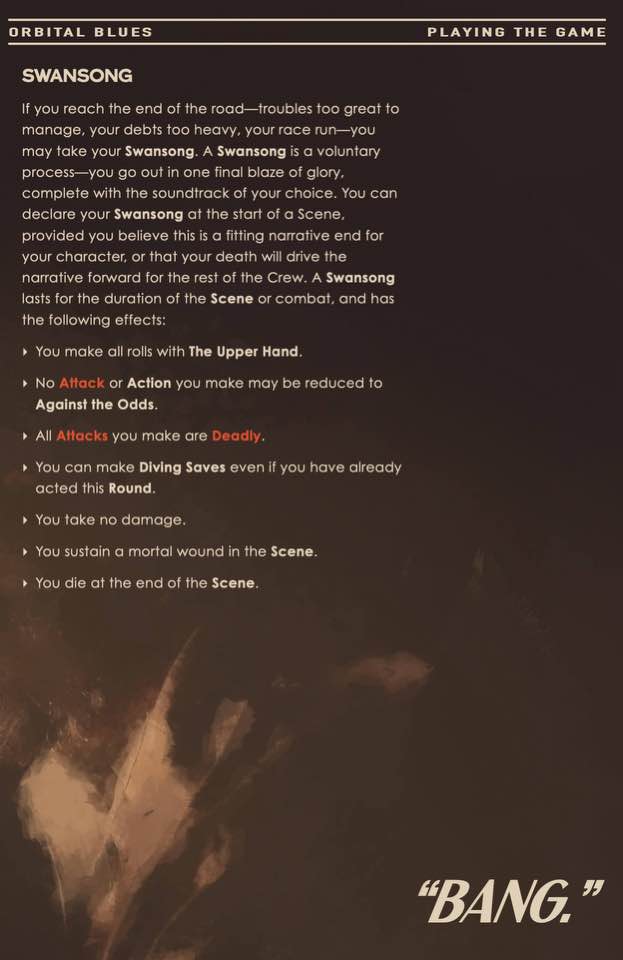
Last night, I had the distinct pleasure of playing in a Fearful Symmetries one-shot run by Steve Dempsey who wrote the Fearful Symmetries frame for Pelgrane Press’ Trail of Cthulhu. I wrote the following earlier today for the Raspy Raven server as a play report, focused on what Fearful Symmetries brings to the table as Steve had already written a summary play report.
In case you don’t know, Fearful Symmetries is Steve’s mashup of Lovecraftian Mythos and William Blake’s mythology, with a heavy emphasis on English folklore. (The companion Book of New Jerusalem by Paula Dempsey offers plenty of English occultic/folklore to help GMs and work as a player resource.
While my focus as an academic is writing studies and medieval England and Old Norse-Icelandic literature and culture, I’ve delved deeply into Romantic literature as well while a Masters student, including taking a grad seminar on Blake, so when I learned Pelgrane was releasing Fearful Symmetries, I pre-ordered and devoured the book when the pdf was released. I love what Steve has done here, and sadly I haven’t had a chance to run it yet, so, with that context, here’s my thoughts on the Fearful Symmetries flavor of ToC (Note: I think Steve does a good job of summarizing Blake’s mythology for GMs not well versed in Blake, so don’t let a lack of familiarity with Blake scare you off.)
The basic premise of a Fearful Symmetries campaign is that the Cthulhu Mythos is the corruption that led to the Blakean fall from innocence, from the idyllic state of Albion to our world. Unlike other Cthulhu games, the PCs in Fearful Symmetries are magicians. They are new initiates in a magical order. (Steve offers 4 kinds of magic for a group to choose from.) Each PC can also invoke one of Blake’s 14 Zoas, and when that Zoa manifests, the PC gains an additional power. In a campaign, as the PCs become more powerful, they lose parts of their humanity but become better able to restore England to Albion.
That’s campaign play. As a one-shot, the focus was the immediate threat. We were on the newer end of the magician power spectrum, but we could wield magic not available to a standard Cthulhu game investigator. My character, for instance, could invoke the Vala Zoa, which gave the character an affinity with animals. It was a lucky choice for our one-shot. We also had the ability to invoke magical sight to see into the magic realm and see such things as ley lines, some kind of ichor covering a magical stone, an entrance into a giant’s realm, and a bogart who became one of our more helpful source of information.
At the end of the scenario, we needed to banish the Mythos entity by casting a ritual and holding the entity off until the ritual was finished. As an NPC and a PC cast the ritual, a second PC used a flaming spear they’d crafted to physically engage the entity, while the 3rd and 4th PCs, including mine, repeatedly cast binding spells to try to keep the thing from attacking us.
Part of the Fearful Symmetries magic system relies on correspondences, which can help reduce the difficulty rating of spell casting. The spear was forged on a Sunday using an appropriate material based on magical correspondences, and we confronted the entity on a Monday for its magical correspondence. To cast the binding spells, we used wands of willow decorated with newly picked mallow flowers, all chosen for their magical correspondences to make the spell casting easier.
Using the correspondences to reduce the difficulty rating is important, because the higher your skill roll, the more powerful your spell. (Standard General Ability test in GUMSHOE games like *Trail of Cthulhu* is to roll a d6 and meet or beat the Difficulty Rating, which is generally 4. You can spend General Ability pool points such as Weapons to boost the roll. Once you run out of pool points, you’re left with just rolling a d6 until you can refresh your pool points.)
To cast a spell, whether forging the magical spear, creating a sphere of unseeing around us earlier in the game, or casting the binding spell, you make the skill roll adding in points from relevant General and Investigate abilities at a cost of 1 pool point for a 1-point bonus from a General Ability or 1 pool point for a 3-point bonus from an Investigative Ability. Different kinds of spells have different point caps. For instance, we could drop up to 10 points on the sphere of unseeing, which naturally degraded 1-point per day but was also degraded by a point value when someone tried to see us. In the case of the binding spells, our total binding points per turn were challenged in an opposing test by the Mythos’s entity (see below).
The way the point spends to bolster the power of a spell works much like General and Investigative spends to bolster combat in the GUMSHOE swords and sorcery game Swords of the Serpentine by Kevin Kulp and Emily Dresner, although there’s no token refreshes available in *Fearful Symmetries*. To cast a spell, you must use at least one point of Stability (also true for invoking the Zoa and the magical sight.)
So, to bind the entity to keep it from attacking us, or at least to reduce the damage it might cause, my character had to cast the spell each round. We had enough correspondences to reduce the difficulty to 2, and we could use up to 6 points per casting to boost the skill roll. (We had to cast the spell each round of combat). In addition to the 1 point of Stability, I used points from relevant skills such as the Weapons and Magic General Abilities and the Occult Investigative Ability.
The entity used its Scuffling ability to try to break through the binding spells and lash out at us. Some rounds we kept it pinned down, and some rounds it got through our spells enough to cause some physical damage.
Clearly, the way magic works in Fearful Symmetries is quite different than standard Cthulhu games like Call of Cthulhu, *Trail of Cthulhu*, *Delta Green*, and *Fall of Delta Green*, and thematically it’s a great addition that makes Fearful Symmetries so cool. (Technically, if you wanted a magic system beyond what is available in the standard *ToC* game or what’s offered in Rough Magicks, you could port the magic system into any Trail of Cthulhu game, but you really need to embrace the frame of the PCs being powerful magic users. It will radically change your game.)
So, to wind up, the combination of Blakean mythology, English folklore, and the Cthulhu Mythos along with the magic system makes for an awesome game. I could see this as I read the book, and if anything, in play it was even better than I imagined it would be. I’m sure some of that is from having Steve run the game — any game is going to shine when the designer is running it — but the awesomeness very much comes from the frame itself.
Reflecting on the experience, the initiating frame and guidance presented in the Fearful Symmetries book and the Book of New Jerusalem are both really useful are both really useful tools for running a Fearful Symmetries campaign, I’d love to see some published scenarios, some blog articles at the Pelgrane Press website, or even a few actual plays highlighting how to incorporate English folklore. Again, I don’t want to drop spoilers, but Steve added in some well known nursery tale folklore into our game in addition to more specific regional folklore that I had to look up. Frankly, I’m not sure I would have ever thought about incorporating the nursery tale/rhyme folklore into the game, but having experienced it, it was both delightful as a player running a PC and eye opening as a GM.
If you haven’t checked out Fearful Symmetries, you should. Doubly so if you’re a group well experienced with Cthulhu gaming as Fearful Symmetries gives you a way to radically reframe Cthulhu gaming while remaining Cthulhu gaming.
[Update: I just learned from Steve that there’s a 22-session actual play of Fearful Symmetries run by Lowell Francis.]
